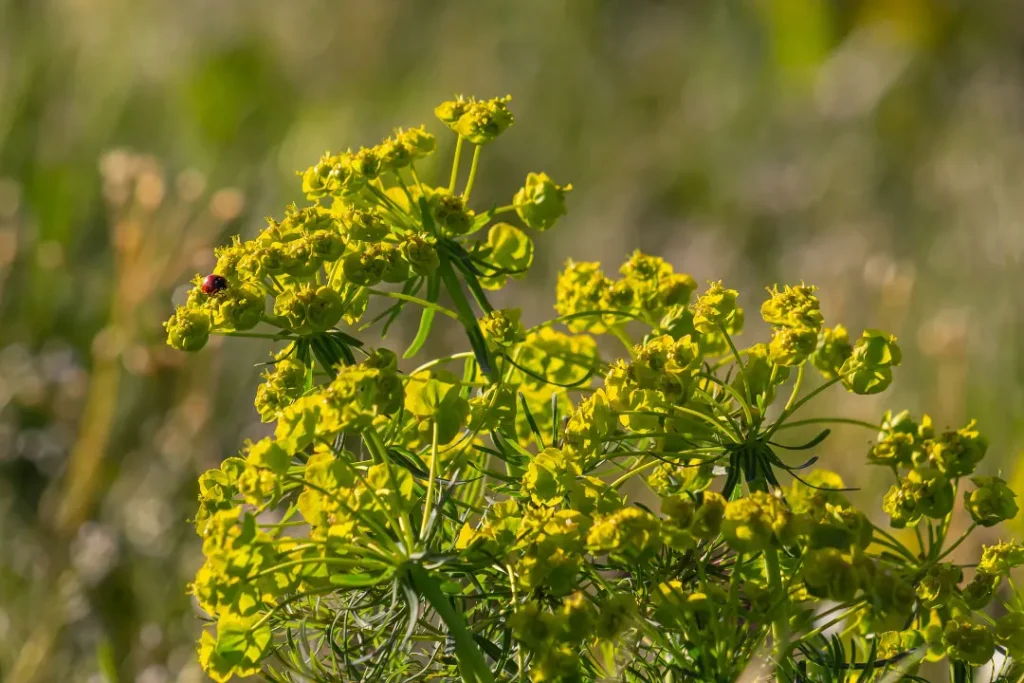The nutritional supplement market is wide and diverse, with products coming from both traditional and unconventional sources. One such unconventional source, Cypress Spurge (Euphorbia cyparissias), which has historically been used medicinally, is now gaining attention from scientific and nutritional communities as a possible dietary supplement. In-depth analysis of the properties of Cypress Spurge is provided in this article, along with details on the supplement’s advantages for health, recommended dose, possible side effects, drug interactions, and other relevant data that could impact your decision to add it to your diet.
You May Also Like:
The Best Supplements for Brain Injury: 5 Top Brands Reviewed
The Nature of Cypress Spurge
The Euphorbiaceae family of perennial plants includes Cypress Spurge, which is indigenous to Western Asia and Europe. This plant is distinguished by its cluster of tiny, yellow-green blooms and needle-like leaves. Since ancient times, traditional medicine has made use of its potential, particularly for the treatment of digestive and skin diseases.
A family of substances known as diterpenoids, notably those from the jatrophane and tigliane subclasses, are principally responsible for the chemistry of Cypress Spurge. The biological activity of these diterpenoids include anticancer, antibacterial, and anti-inflammatory effects. Alkaloids, phenolic acids, and flavonoids, all of which contribute to the plant’s health-promoting effects, are also present in Cypress Spurge, albeit lower concentrations.
Health Benefits of Cypress Spurge
- Potent Anti-Inflammatory and antibacterial activities: The diterpenoids in Cypress Spurge have strong anti-inflammatory and antibacterial activities. They can prevent the release of cytokines that promote inflammation, which can lessen swelling throughout the body. They also have antibacterial action against a variety of bacteria, such as Escherichia coli and Staphylococcus aureus.
- Anticancer Effects: Numerous studies have identified the Cypress Spurge’s anticancer potential, particularly in connection to its jatrophane diterpenoids. These substances have been discovered to cause tumor cells to undergo apoptosis (programmed cell death), which slows the progression of some malignancies.
- Neuroprotective Potential: Although research is still in its early stages, preliminary studies suggest that Cypress Spurge may have neuroprotective properties, particularly due to the flavonoid content of the plant. It is known that flavonoids shield neurons from oxidative stress and inflammation, potentially slowing the progression of neurodegenerative diseases like Alzheimer’s and Parkinson’s.

Chemistry of Cypress Spurge
Diterpenoids, particularly jatrophane and tigliane diterpenoids, are the most prominent elements of the complex chemical profile of Cypress Spurge. The distinct structure of these intricate organic compounds enables a wide range of biological activity. Alkaloids, nitrogenous organic compounds with a wide range of biological activity, phenolic acids, and flavonoids, which both have antioxidant qualities, are additional components of Cypress Spurge.
Physiological Mechanism of Action
- Diterpenoids have anti-inflammatory actions by preventing the release of pro-inflammatory cytokines. They also have antimicrobial properties. These chemicals have a role in the immune response and, when produced in excess, can cause inflammation. Diterpenoids can aid in the management of inflammation by preventing their release. Additionally, certain alkaloids and diterpenoids have antibacterial properties that inhibit the development of a range of bacteria.
- Anticancer Activity: Jatrophane diterpenoids found in Cypress Spurge have anticancer properties. They are thought to cause tumor cells to undergo apoptosis. This prevents the cancer cells from growing and multiplying, which slows the disease’s course.
- Potential Neuroprotective Effects: Early study suggests that the flavonoids in Cypress Spurge may have potential neuroprotective effects. These substances have a reputation for shielding neurons against oxidative stress and inflammation, two factors linked to the development of neurodegenerative disorders. Flavonoids may contribute to the preservation of neuronal health and function by reducing oxidative stress and reducing inflammatory reactions.


Optimal Dosage of Cypress Spurge
Determining the ideal dose of Cypress Spurge can be difficult but should be determined in consideration of factors including your age, personal health state, and the unique composition of the supplement, as is the case with many plant-derived supplements. There isn’t yet a standard dose for Cypress Spurge. Therefore, before starting a regimen, users should proceed cautiously and obtain expert advice from healthcare specialists.
Side Effects of Cypress Spurge
Cypress Spurge may have a number of advantages, but it’s crucial to be aware of any possible drawbacks as well. A poisonous latex found in the plant’s sap can result in skin rashes, as well as blistering and irritation of the skin. It can cause nausea, vomiting, and diarrhea if consumed. Consumption over a long period of time or in excess may harm your kidneys and liver. As a result, Cypress Spurge must always be administered under a doctor’s supervision.


Potential Substance Interactions with Cypress Spurge
There is a possibility for interactions with other drugs since the components of Cypress Spurge have powerful biological activity. Theoretically, its anti-inflammatory characteristics might conflict with the effects of non-steroidal anti-inflammatory medicines (NSAIDs), raising the risk of gastrointestinal problems. Additionally, the diterpenoids from the plant may interact with specific chemotherapy drugs to change how successful they are at treating cancer.
Responsible Use of Cypress Spurge
Despite its possible health advantages, Cypress Spurge is a strong plant that should only be taken in accordance with expert advice owing to its toxicity and potential interactions. To completely comprehend the characteristics of this plant and to determine the most secure and efficient ways to utilize its health advantages, more study is required. Non-traditional supplements like Cypress Spurge can provide fresh ways to health and wellbeing as our knowledge of nutrition and medicine continues to advance. However, when using them, the “first, do no harm” philosophy should always come first.
Cypress Spurge: Conclusion
Cypress Spurge has a complex chemical makeup that directly contributes to its ability to target and ameliorate a swath of health conditions. It can assist in to reduce the presence of problems associated with cancer, neurodegeneration, inflammation, and bacterial infections. The effects of its usage are formidable and should be monitored carefully by you and your trusted health care professional. Cypress Spurge has a substantial history of medicinal use, and due to modern techniques in scientific research, the medical applications are increasing. Add this article to your personal library as you consider information that influences your choice to integrate Cypress Spurge into your health regimen.
References:
- “Flavonoids and the Brain: Interactions at the Blood–Brain Barrier and their Physiological Effects on the Central Nervous System.” Retrieved From: https://pubmed.ncbi.nlm.nih.gov/15528027/
- “Natural terpenoids with anti-inflammatory activities: Potential leads for anti-inflammatory drug discovery.” Retrieved From: https://pubmed.ncbi.nlm.nih.gov/35490583/
- “Anticancer Properties of Phenolic Acids in Colon Cancer – a Review.” Retrieved From: https://www.researchgate.net/publication/301304082_Anticancer_Properties_of_Phenolic_Acids_in_Colon_Cancer_-_A_Review
Important Note: The information contained in this article is for general informational purposes only, and should not be construed as health or medical advice, nor is it intended to diagnose, prevent, treat, or cure any disease or health condition. Before embarking on any diet, fitness regimen, or program of nutritional supplementation, it is advisable to consult your healthcare professional in order to determine its safety and probable efficacy in terms of your individual state of health.
Regarding Nutritional Supplements Or Other Non-Prescription Health Products: If any nutritional supplements or other non-prescription health products are mentioned in the foregoing article, any claims or statements made about them have not been evaluated by the U.S. Food and Drug Administration, and such nutritional supplements or other health products are not intended to diagnose, treat, cure, or prevent any disease.
